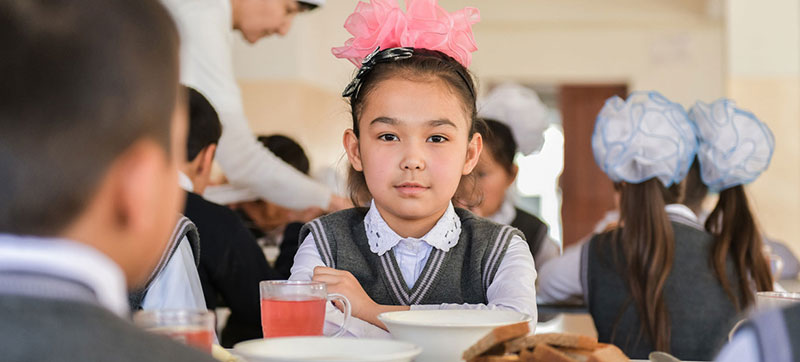 Schools Reopen
Schools Reopen COVID jabs needed for educators and kids to keep schools open: WHO, UNICEF
As the school year begins for millions of children in Europe and Central Asia, UN health and child experts on Monday issued a series of COVID-19 risk reduction measures to ensure that in-person lessons can go ahead, despite rising infection rates.
In addition to calling for all school staff to be included in nationwide coronavirus vaccination plans, children aged 12 and above who suffer from underlying health conditions should also be immunized amid rising Delta variant numbers, said UN Children’s Fund UNICEF and the World Health Organization (WHO).
Online limits
Highlighting the quick roll-out of online lessons in Serbia when the pandemic began last year, Belgrade high school teacher, Milena Maric, backed the UN-led call for greater protection measures.
“The students lacked continuity, socializing, collaborative work, the sharing of ideas in real time, communication without technology,” she said. “I know that the only way out of this situation is if we keep respecting measures to prevent the transmission of the virus and if we vaccinate all educators.”
Within all 53 countries that make up the WHO European Region, the UN agencies urged better classroom ventilation, smaller class sizes where possible, physical distancing and regular COVID-19 testing of children and staff.
Learning for mental health and protection
“The pandemic has caused the most catastrophic disruption to education in history. It is therefore vital that classroom-based learning continues uninterrupted across the European Region”, said Dr. Hans Kluge, WHO Regional Director for Europe. “This is of paramount importance for children’s education, mental health and social skills, for schools to help equip our children to be happy and productive members of society.”
The implementation of such measures is of key importance to the mental health of youngsters and should “remain our primary objective, so we don't rob them of the opportunities they so deserve”, Dr Kluge added.
Delta threat
Although a full COVID-19 vaccination course significantly reduces the risk of severe disease and death, the high incidence of the Delta variant in many countries - including a majority of those in the European Union – has made the risk of transmission within schools “much more likely”, both UN agencies warned.
To counter this – and another year of disrupted schooling - more people need to be offered the COVID-19 jab, they said.
“Vaccination is our best line of defence against the virus”, Dr. Kluge said. “And for the pandemic to end we must rapidly scale up vaccinations fairly in all countries, including supporting vaccine production and sharing of doses, to protect the most vulnerable, everywhere. We must also continue to follow the public health and social measures we know work, including testing, sequencing, tracing, isolation and quarantine.”
Pandemic ‘not over’
Echoing that message, UNICEF insisted that everyone could contribute to keeping schools open by signing up for the vaccine.
“The pandemic is not over…Children and youth cannot risk having another year of disrupted learning. Vaccination and protective measures together will help prevent a return to the darkest days of the pandemic when people had to endure lockdowns and children had to experience disruption of learning,” said Philippe Cori, Deputy Regional Director, UNICEF Europe and Central Asia.
Describing children as “the silent victims of the pandemic”, Mr. Cori noted that the most marginalized have been amongst the hardest-hit by COVID-19 disruption, as they were “already out-of-school, or in school, but not learning at the same level as their classmates”.
Schools are “so much more than a building”, the UNICEF senior official said. “It's a place of learning, safety and play, at the heart of our communities. When they are closed, children, miss out on learning, being with their friends and may be exposed to violence in the home. The pandemic worsened an already unacceptable situation - we must ensure that schools reopen, and they stay open safely.”
The eight key recommendations to help keep schools open and safe, endorsed by WHO, UNICEF and UNESCO and developed by the WHO European Technical Advisory group for schooling during COVID-19:
Schools to be among the last places to close and first to re-open.
Put in place a testing strategy.
Ensure effective risk-mitigation measures.
Protect children’s mental and social well-being.
Protect the most vulnerable and marginalized children.
Improve the school environment.
Involve children & adolescents in decision-making.
Implement a vaccination strategy designed to keep children in school.
Support Our Journalism
We cannot do without you.. your contribution supports unbiased journalism
IBNS is not driven by any ism- not wokeism, not racism, not skewed secularism, not hyper right-wing or left liberal ideals, nor by any hardline religious beliefs or hyper nationalism. We want to serve you good old objective news, as they are. We do not judge or preach. We let people decide for themselves. We only try to present factual and well-sourced news.







